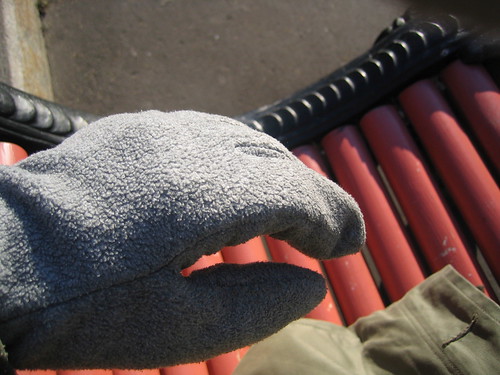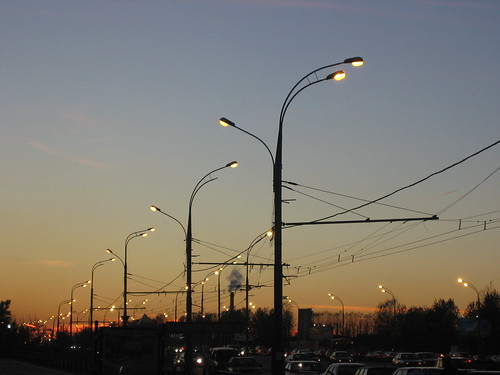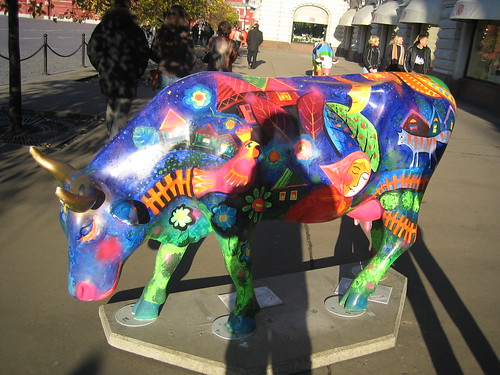TOM FRANCIS
REGRETS THIS ALREADY
Hello! I'm Tom. I'm a game designer, writer, and programmer on Gunpoint, Heat Signature, and Tactical Breach Wizards. Here's some more info on all the games I've worked on, here are the videos I make on YouTube, and here are two short stories I wrote for the Machine of Death collections.
Theme
By me. Uses Adaptive Images by Matt Wilcox.
Search
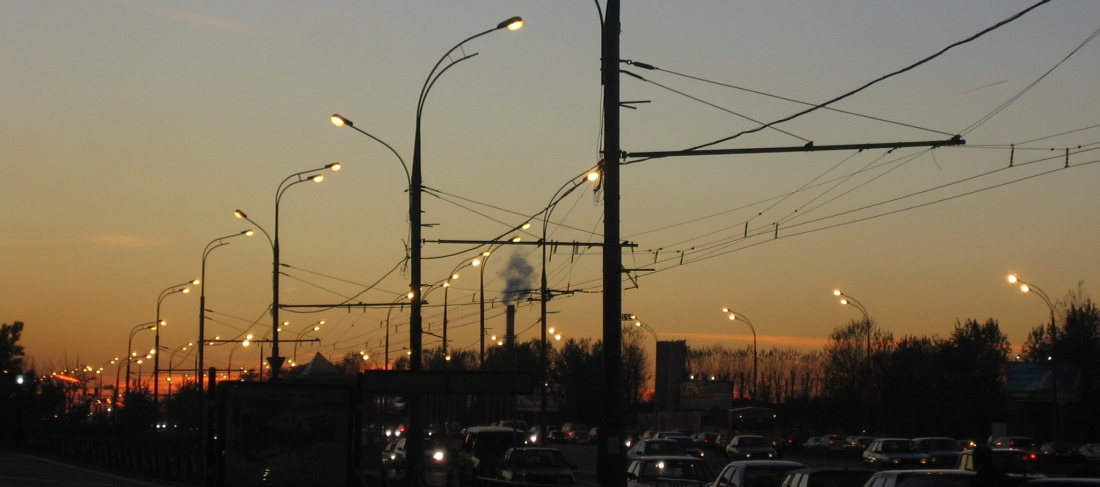
Mockba
Mark: Who wants to go to Moscow?
Me: What’s the game?
Mark: It’s not just about the game, it’s about getting to go to Moscow.
Me: I just want to be sure that I would be the best person for the job.
(All laugh)
Okay, so it was also about getting to go to Moscow. And since I can’t talk about the game here anyway, except to reassure you that I was indeed qualified to be told about it and play it a bit, I will talk instead about Moscow. Which looks like ‘Mockba’ when you write it down in Russian, and as far as I can tell should be pronounced ‘Moscvaa’.
I took my German army coat, since it’s my warmest coat, and Moscow is said in fable and legend to be coldish. It didn’t occur to me until we got there that the only thing German army coats are famous for is being inadequate against Russian winters. In fact, making people in German army coats cold is one of the main things Russian winters are famous for. The other is being cold.
I actually liked the weather. Mike, the developer’s Business Manager, does too – he’s American but has been living in Moscow for years. He says “It’s Christmas six months of the year, it’s great.” I’m sure I’d get sick of it, but for the days we were there, I enjoyed having a cold face and well-cocooned body. The coat was actually fine.
Mike’s best friend runs a historical restaurant on Red Square, in the same building as the State Museum. They sometimes recreate specific meals that Russian authors had, but the one we had was I think just generally old fashioned – a five-course banquet of quintessentially Russian and frequently enigmatic food- and drink-stuffs.
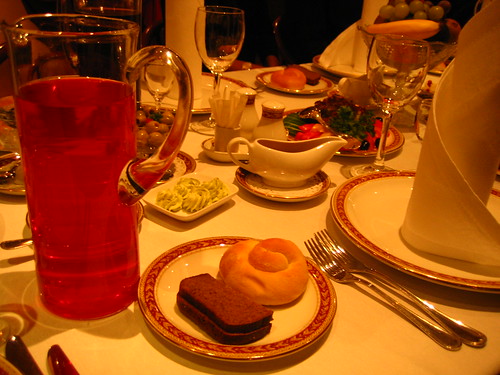
The red stuff in the big jug was some kind of cranberry drink – not juice, since it was both sweeter and weaker somehow. There was another of a black liquid, which Mike calls the Russian coke. It’s really a kind of beer – although it does indeed taste like coke – made from the malty, sour black bread on the plate above. It’s surprisingly nice. We also had small glasses of a pale brown liquor, which I thought tasted like a dry sherry but is apparently some form of vodka distilled from baked pine nuts. As you’ll deduce if you mentally compare the alcohol percentages of those two, it’s much stronger than it tastes – a rare and wonderful quality in a spirit. It also meant that, with the red wine that came later, we had beer, wine and spirits simultaneously. I didn’t experience any ill effects, but I’m suspiciously resilient to the normal consequences of drunkeness anyway.
I think I probably enjoyed the endless bizarre courses, powerful concoction of drinks and ridiculous fussing of the waiters (who insisted on doing the serving even from the plates on the table, and would offer everything three times if you refused) more than the others, perhaps because I was in museum/culture mode rather than the Must Eat Now one. It’s nice to have weird stuff forced on you, I think, because you won’t choose it if it’s not, and won’t experience anything new if you don’t. To that end, I tried some caviar. It was mostly tasteless with a deeply unpleasant texture, but at least now I’ve tried caviar.
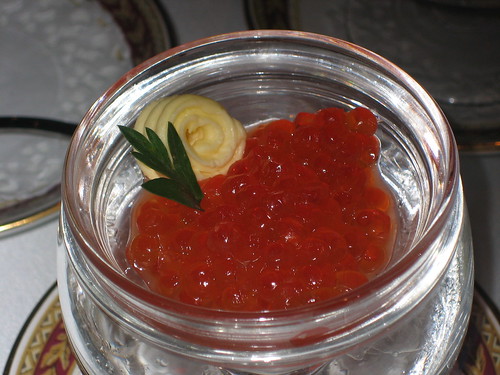
Moscow itself is stunning, ugly, proud, cold, sunny and sad. My guidebook was pretty light on where anything was or how to get there, but it did have a timeline of the city’s history, and if you remember the time-lapse scene in the very first episode of Futurama, where civilisation is repeatedly built up and then destroyed by aliens, you’ve got the basic gist. Usually I don’t really care to know the history of a place, but in this case it put a lot of that sadness, and scaffolding, in context. We found the people themselves to be very warm and kind when they understood us, which was understandably rare since we didn’t speak a word of Russian (except a few of the German journalists (who were big fans of my coat) and I who had learnt spaseeba (thank you), and were damned if we’d let a conversation pass in which we didn’t use it), but each of the ubiquitous uniformed officials looked like they wouldn’t know a smile if they shot it, which seems increasingly likely each time you try one.
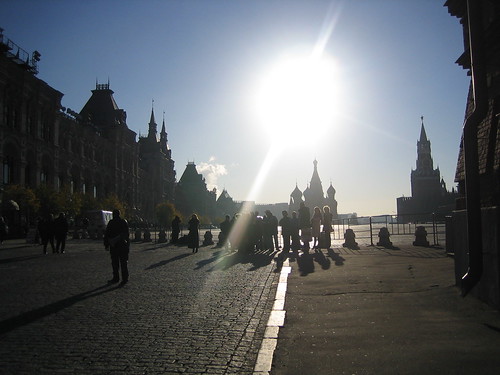
Almost as intimidating as the guns and uniforms is something that, by contrast, doesn’t actually represent any hostility or mistrust: you can’t read anything. Technically I can’t read anything in any foreign countries, but somehow when it’s the letters you can’t read, not just the words, it’s a whole new level of not being able to read anything. This became particularly apparent on the Metro when, as Rick observed, “We don’t know where we are or where we’re going and we can’t read any signs that would tell us either.” After discovering that the colour-coded lines could change colour depending on the artist’s mood, and that numbered lines were either working in base nineteen or simply false, I decided we would actually be fine if we just went by the place names, which we merely couldn’t read. At least they weren’t actually lying to us.
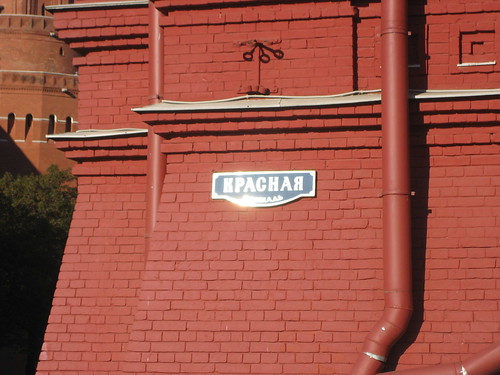
This actually did work, thanks in part to my maths degree having involved a lot of Greek letters, which constitute most if not all of the non-Roman characters is the Cyrillic alphabet. That’s not the whole story, since half of the apparently familiar characters are phonetically completely different to their counterparts in other European languages, but it does mean I could recognise place names by their first three letters if I saw them again. Naturally this appeared to be some form of black magic to the casual observer, and led to James comparing me to Locke. I choose to believe he was referring to Locke’s comfort in new and alien surroundings, rather than his sad existence before the crash.
This cryptography and navigation eventually got us to the station where a very helpful waitress had assured us there was a cheaper version of the great-looking market featured in my guidebook. It seems there may have been a misunderstanding of the word ‘market’, though, since this was actually a supermarket. Cheap, sure, but not quite the cultural experience we’d envisaged. In fact, though, once the angry officials had sealed our bags in cellophane so we couldn’t slip anything into them while browsing, it was a kind of cultural experience. Usually as a tourist you only get to see historical things that aren’t an important part of people’s lives anymore. We went to Asda, or nearest equivalent. And bought vodka, which at £5 a bottle was one of the most expensive types they had.
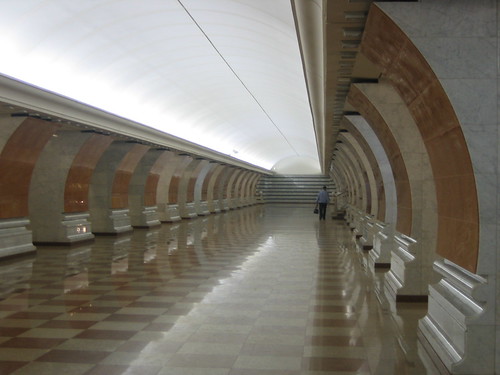
We split up in the afternoon and I went on a mission to see some good underground stations. The Russian metro was built to be a network of underground palaces, and so far the ones we’d seen had been undergound stations that looked like they might once have been underground palaces. The one at Victory Park, though, was rebuilt recently, to the 1930s spec. Sure enough, it’s a gleaming wonder in marble, with huge murals and elegant statues. Victory Park itself is impressive, too. The epic monument at the far end is 10cm tall for every day Russia was at war, and you don’t have to spend a lot of time there to find the place itself has nothing to do with the jubilant spirit of the name. It’s not a monument to victory, and it’s not even a monument to how long they were at war, it’s a monument to national pain. It says, to me at least, feeling rather self-conscious with a German flag on my shoulder, “Every day of war is a tragedy. Every day of war means something. It’s another great slab of marble on this pointless needle of suffering.” And, with the station below it, it’s virtually the only thing I saw in Moscow that looked proud, defiant, finished. Pain they can do.
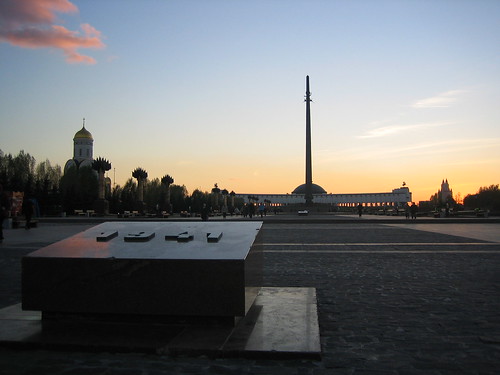
That night we were accosted by a group of school-age girls hanging around a brightly coloured cow. They collared James and managed to convey that their enterprise had something to with dreams and money. Usually when people stop you on the street it’s to extract money from you, so I was dubious, but James merrily filled his dreams (“I dream of an age when man flies in the sky in giant metal machines”) on a pink card, added his details and dropped it in the cow. I managed to stay out of it while this was going on, but once they’d roped Roxy in too, they activated that special kind of pleading that somehow generates an atmosphere in which negative responses lose all force, and the only way out is a reluctant “Okay”. The deal seemed to be that if your dream was later selected as the best, you’d recieve the aforementioned money. Mine (“My very own walrus!”) is sure to win, but they may have trouble reaching me on the number I gave.
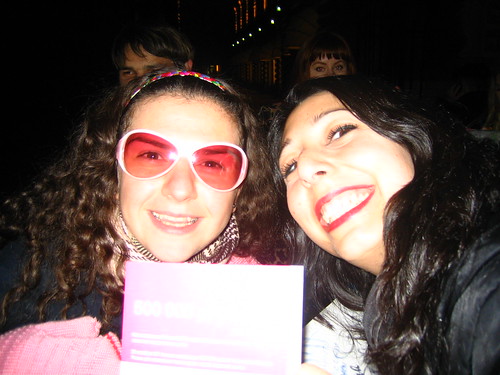
We were leaving the next day, and the Kremlin had been closed until then, so I set out early to see as much of it as I could before our flight. I couldn’t stomach the hotel breakfast (cauliflower, meatballs in sauce, diluted orange juice and DIY instant coffee from ageing sachets) so I headed to a café I’d liked the look of the previous day. It was an Italian café, in Russia, and I was an Englishman wearing a German flag on my coat, and when I walked in the waitress said “Bonjour!” It was a freezing and dazzling jour, and the coffee, orange juice and giant chocolate pear gateaux were all excellent, so I decided it probably was fairly bon, and tipped accordingly. It took a turn for the malheureux when I actually got to the Kremlin, though, since they won’t let you in with a bag. Nor will they take your bag, except at the special bag tower, which was not where it was supposed to be or indeed anywhere at all as far as I could tell. It was a tight thing anyway, and with the strongest and strangest bag restriction yet, it wasn’t long before I realised there was no way to get inside and out again and still catch a plane. If you ever go to Moscow, don’t go on a Thursday, and find a way to not have a bag.
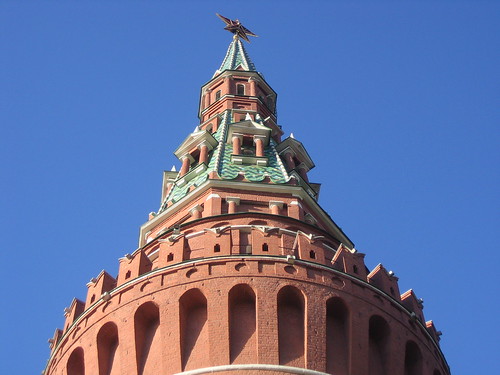
I did something I’d also wanted to do before I left, instead – sat in a freezing park and read a book. Cold weather always seems to be ushering you indoors, so I wanted to hang around outside intentionally to show it who I felt was the boss around here. It took gloves, a scarf, and some occasional bench-switching to stay in the rapidly ascending sun, but it was actually a profoundly peaceful experience. Coldness has a special silence to it, free of birds or people enjoying themselves. Everyone shuts up and tries to get out of it, which makes it a uniquely nice place to be. Then a guy came over and sat down next to me instead of any of the five other benches. I thought he might be expecting me to say a code-phrase and switch bags with him, but then I noticed that he, like all Russians, didn’t have a bag.
